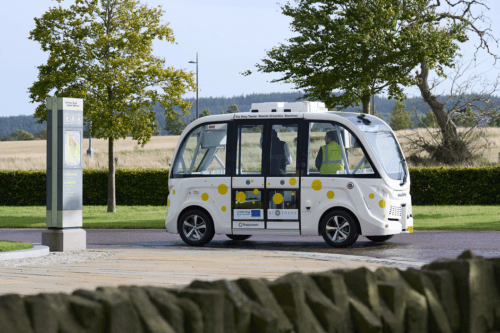Scotland’s first trial of an automated passenger bus service has been launched in the Highlands by HiTrans and Stagecoach
Stagecoach and HiTrans, the Highlands and Islands Transport Partnership – the regional transport partnership covering Scotland’s Western Isles, Orkney, Highland, Moray and most of the Argyll and Bute area – launched Scotland’s first fully-autonomous passenger service pilot on Thursday 6 October at Inverness Campus, where representatives from a number of key organisations attended to see the autonomous vehicle in action.
HiTrans is working with a number of partners to deliver the project; alongside Stagecoach, these include autonomous vehicle manufacturer Navya, The Highland Council, Inverness Campus and the University of the Highlands & Islands in Inverness. The autonomous passenger service runs along a three-kilometre route linking Inverness Campus with the Inverness Retail & Business Park, including a railway crossing facilitated by a recently introduced sustainable travel bridge. The corridor is restricted to public transport, walking, and cycling only, with those walking and cycling segregated from road vehicles across most of the route.
One vehicle operates on the journey between Eastfield Way at the Retail Park and Inverness Campus between 1000 and 1620hrs Monday to Saturday, carrying up to 15 passengers – 11 seated and four standees. The service will be free for the first six weeks following the launch, after which a nominal fee will apply until the trial ends in March.
HiTrans says it is exploring funding opportunities to keep the pilot running at Inverness Campus, involving different routes, and is also looking to offer demand-responsive transport booking options for the bus so that it can be used in the evening. In the longer term, HiTrans says it intends to trial the technology in other locations in the Highlands and Islands. The scheme’s partners said they are keen to see the services used as much as possible throughout the trial, and will look to work with schools to support educational visits to allow young people to travel on the service.
The trial is seen as complementary to a project in Hannover, Germany, where a similar autonomous bus shuttle is being trialled between a tram stop and a new university campus. Monitoring will be conducted throughout the pilot on various technological aspects as well as social impacts; the aim of the pilot project is not only to test the viability of a route operated by an autonomous vehicle (AV), but also to test the technology required to use AVs in combination with other transport modes and better understand user perceptions.
Councillor Uisdean Robertson, Chair of HiTrans, said: “We are delighted to be piloting this pioneering project as we are committed to encouraging multi-modal travel and reducing dependency on private car use. We have been able to lead on this project by attracting European funding and we hope the lessons learned from the pilot will help shape the future roll out of AV not only here but across Europe.”
Jayne Golding, Projects and Policy Manager at HiTrans, added: “Safety is paramount to the project and all UK regulation relating to autonomous vehicles will be complied with. While the vehicle might be capable of driving itself without being controlled by an individual, an operator will be always present in the vehicle. The driving task will be delegated to the vehicle, but the operator will be ready to take control whenever they are required to do so.”
Stagecoach Highlands Managing Director David Beaton said: “As a company with innovation firmly at our heart, we are very excited to be involved in the pilot of the autonomous technology in Inverness. Autonomous vehicle technology can provide major benefits, with evidence suggesting that it can further enhance safety, deliver fuel and efficiency savings from more optimised braking and acceleration, as well as a better overall customer experience.”


